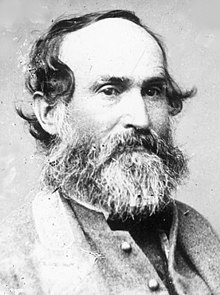
Back جوبال اندرسون ايرلى ARZ جوبال ارلی AZB Jubal A. Early Danish Jubal Anderson Early German Τζάμπαλ Άντερσον Ήρλυ Greek Jubal Anderson Early Spanish جوبال ارلی Persian Jubal Early Finnish Jubal Anderson Early French Jubal Anderson Early Hungarian
Jubal Early | |
|---|---|
 Early, c. 1861–1865 | |
| Member of the Virginia House of Delegates from Franklin County | |
| In office 1841–1842 | |
| Preceded by | Wyley P. Woods |
| Succeeded by | Norborne Taliaferro |
| Personal details | |
| Born | Jubal Anderson Early November 3, 1816 Franklin County, Virginia, U.S. |
| Died | March 2, 1894 (aged 77) Lynchburg, Virginia, U.S. |
| Resting place | Spring Hill cemetery, Lynchburg |
| Political party | Whig |
| Relatives | John Early (1st cousin twice removed) |
| Alma mater | United States Military Academy |
| Profession |
|
| Signature | |
| Nickname(s) | "Old Jube" "Old Jubilee" "Bad Old Man" |
| Military service | |
| Allegiance |
|
| Branch/service |
|
| Years of service |
|
| Rank |
|
| Commands | |
| Battles/wars | |
Jubal Anderson Early (November 3, 1816 – March 2, 1894) was an American lawyer, politician and military officer who served in the Confederate States Army during the Civil War.[1] Trained at the United States Military Academy, Early resigned his United States Army commission after the Second Seminole War and his Virginia military commission after the Mexican–American War, in both cases to practice law and participate in politics. Accepting a Virginia and later Confederate military commission as the American Civil War began, Early fought in the Eastern Theater throughout the conflict. He commanded a division under Generals Stonewall Jackson and Richard S. Ewell, and later commanded a corps.
A key Confederate defender of the Shenandoah Valley, during the Valley campaigns of 1864, Early made daring raids to the outskirts of Washington, D.C., and as far as York, Pennsylvania, but was eventually pushed back by Union Army troops led by General Philip Sheridan, losing over half his forces. After the war, Early fled to Mexico, then Cuba and Canada, and upon returning to the United States took pride as an "unrepentant rebel." Particularly after the death of Gen. Robert E. Lee in 1870, Early delivered speeches establishing the Lost Cause of the Confederacy, cofounding the Southern Historical Society and several Confederate memorial associations.[2]
- ^ John Y. Simon; Michael E. Stevens (2003). New Perspectives on the Civil War: Myths and Realities of the National Conflict. Rowman & Littlefield Publishers. p. 114. ISBN 978-1-4616-1052-6.
- ^ J. Tracy Power, "Jubal A. Early (1816–1894)" Archived November 26, 2022, at the Wayback Machine